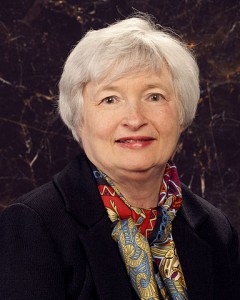Since former Federal Reserve Chairs Alan Greenspan and Ben Bernanke imposed artificially record-low interest rates, many investors have sought out riskier investments for greater rates of return. This has led numerous financial analysts and banking officials to call out bubbles in various sectors of the stock market – low rates are the reason for record high stock market prices and demands for corporate bonds.
David Stockman, former Reagan budget director and bestselling author of “The Great Deformation,” has cited the housing and bond markets as being in bubbles, while other traditional investors have pegged social media and technology as getting injected with the bubble bug.
 However, despite the danger of bubbles, Fed Chair Janet Yellen has confirmed that she won’t start raising rates just so a few bubbles can burst. Instead, says Yellen, when the United States central bank starts increasing rates it will be because the Fed has achieved a stable labor market and inflation hits two percent a year.
However, despite the danger of bubbles, Fed Chair Janet Yellen has confirmed that she won’t start raising rates just so a few bubbles can burst. Instead, says Yellen, when the United States central bank starts increasing rates it will be because the Fed has achieved a stable labor market and inflation hits two percent a year.
“I do not presently see a need for monetary policy to deviate from a primary focus on attaining prices stability and maximize employment, in order to address financial stability concerns,” the Fed Chair told an audience at an International Monetary Fund (IMF) lecture in Washington on Wednesday.
Although she noted that she has noticed an uptake in riskier investments in the financial system, Yellen averred that it’s up to financial regulation and not interest rates to provide a secure and unwavering financial marketplace.
An example that she attempted to refute was those who said if the central bank simply raised interest rates in the early- to mid-2000s then the housing collapse wouldn’t have taken place. Yellen argued boosting interest rates would have created widespread unemployment and hurt the ability for households to pay the debts.
“Such an approach would have been insufficient to address the full range of critical vulnerabilities,” said Yellen.
“Policymakers failed to anticipate that the reversal of the house price bubble would trigger the most significant financial crisis in the United States since the Great Depression.”
Critics of the Federal Reserve System say this is just further proof that the central bank shouldn’t be in the business of establishing interest rates. Instead, the U.S. should adhere to market interest rates because no one man or group of people can determine what the proper number is.
Here is what economist Jeffrey Herbener wrote in 1995:
“In fact, a whole host of variables are out of the Fed’s control. It cannot set exchange rates of the dollar, nor interest rates, nor capital values, nor the rate of price inflation. Politically, a central bank exists for one purpose: to keep interest rates low, inflate the money supply, and, thereby, generate economic booms, and reduce the burden of government debt.
“The only rate of interest the Fed can actually set is the discount rate. That’s the rate charged to financial institutions when they borrow from the Fed. If the Fed wants interest rates to fall, it can lower its discount rate; banks will then borrow more from the Fed and have a greater supply of loanable funds. It is the greater supply of loanable funds that lowers rates of interest. But the Fed can only influence, not set, these rates.”
According to Yellen, it wouldn’t have mattered in the end if the Fed increased rates because it still would have led to a financial crisis and done nothing to address the more important facets of the U.S. economy.



